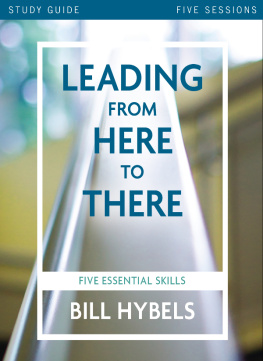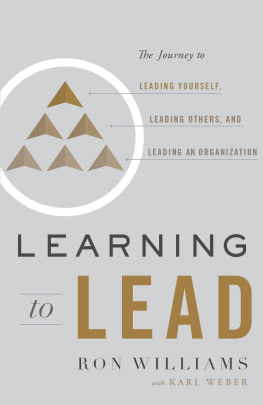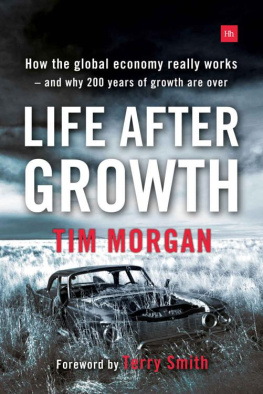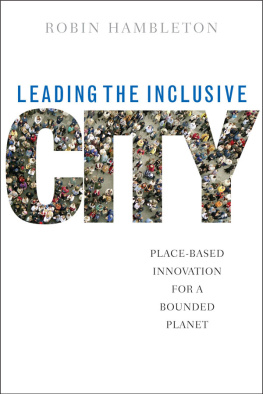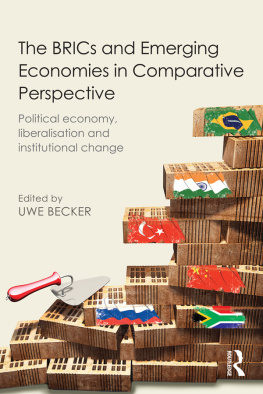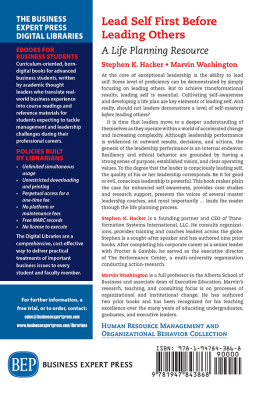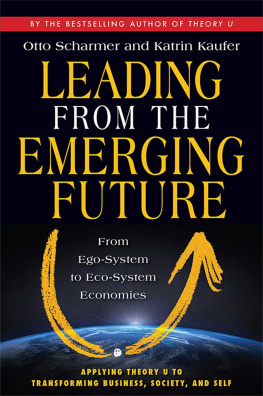LEADING
FROM THE
EMERGING
FUTURE
From Ego-System
to Eco-System Economies

Otto Scharmer and Katrin Kaufer
LEADING
FROM THE
EMERGING
FUTURE
From Ego-System
to Eco-System Economies

Leading from the Emerging Future
Copyright 2013 by Otto Scharmer and Katrin Kaeufer
All rights reserved. No part of this publication may be reproduced, distributed, or transmitted in any form or by any means, including photocopying, recording, or other electronic or mechanical methods, without the prior written permission of the publisher, except in the case of brief quotations embodied in critical reviews and certain other noncommercial uses permitted by copyright law. For permission requests, write to the publisher, addressed Attention: Permissions Coordinator, at the address below.

| Berrett-Koehler Publishers, Inc.
235 Montgomery Street, Suite 650
San Francisco, California 94104-2916
Tel: (415) 288-0260, Fax: (415) 362-2512
www.bkconnection.com |
Ordering information for print editions
Quantity sales. Special discounts are available on quantity purchases by corporations, associations, and others. For details, contact the Special Sales Department at the Berrett-Koehler address above.
Individual sales. Berrett-Koehler publications are available through most bookstores. They can also be ordered directly from Berrett-Koehler: Tel: (800) 929-2929; Fax: (802) 864-7626; www.bkconnection.com
Orders for college textbook/course adoption use. Please contact Berrett-Koehler: Tel: (800) 929-2929; Fax: (802) 864-7626.
Orders by U.S. trade bookstores and wholesalers. Please contact Ingram Publisher Services, Tel: (800) 509-4887; Fax: (800) 838-1149; E-mail: customer.service@ingrampublisherservices.com; or visit www.ingrampublisherservices.com/Ordering for details about electronic ordering.
Berrett-Koehler and the BK logo are registered trademarks of Berrett-Koehler Publishers, Inc.
First Edition
Paperback print edition ISBN 978-1-60509-926-2
PDF e-book ISBN 978-1-60509-927-9
IDPF e-book ISBN 978-1-60509-928-6
2013-1
Produced by BookMatters, cover designed by Steve Pisano, photo of Otto Scharmer by Sven Nieder, copyedited by Laura Harger, proofed by Anne Smith, indexed by Leonard Rosenbaum.
To
HMS and JCS
CONTENTS
INTRODUCTION
Breathing Life into a Dying System
Finance. Food. Fuel. Water shortage. Resource scarcity. Climate chaos. Mass poverty. Mass migration. Fundamentalism. Terrorism. Financial oligarchies. We have entered an Age of Disruption. Yet the possibility of profound personal, societal, and global renewal has never been more real. Now is our time.
Our moment of disruption deals with death and rebirth. Whats dying is an old civilization and a mindset of maximum memaximum material consumption, bigger is better, and special-interest-group-driven decision-making that has led us into a state of organized irresponsiblity, collectively creating results that nobody wants.
Whats being born is less clear but in no way less significant. Its something that we can feel in many places across Planet Earth. This future is not just about firefighting and tinkering with the surface of structural change. Its not just about replacing one mindset that no longer serves us with another. Its a future that requires us to tap into a deeper level of our humanity, of who we really are and who we want to be as a society. It is a future that we can sense, feel, and actualize by shifting the inner place from which we operate. It is a future that in those moments of disruption begins to presence itself through us.
This inner shift, from fighting the old to sensing and presencing an emerging future possibility, is at the core of all deep leadership work today. Its a shift that requires us to expand our thinking from the head to the heart. It is a shift from an ego-system awareness that cares about the well-being of oneself to an eco-system awareness that cares about the well-being of all, including oneself. When operating with ego-system awareness, we are driven by the concerns and intentions of our small ego self. When operating with eco-system awareness, we are driven by the concerns and intentions of our emerging or essential selfthat is, by a concern that is informed by the well-being of the whole. The prefix eco- goes back to the Greek oikos and concerns the whole house. The word economy can be traced back to this same root. Transforming our current ego-system economy into an emerging eco-system economy means reconnecting economic thinking with its real root, which is the well-being of the whole house rather than money-making or the well-being of just a few of its inhabitants. But while the whole house was for the Greeks something very local, today it also concerns the well-being of our global communities and planetary eco-systems.
This shift in awareness from ego-system to eco-system is something that we are approaching and living through not only as groups and organizations, but also as a global community. Pioneering the principles and personal practices that help us to perform this shift may well be one of the most important undertakings of our time.
Crumbling Walls
Numerous books have been written about todays global crises. Why add another one? We hope to contribute some frameworks, methods, and tools that can help leaders and change-makers understand what is going on and be more effective in helping communities shift from ego-system to eco-system economies.
The world has changed. Walls are crumbling. Tyrants are toppling. The polar caps and glaciers are melting. We have been watching these developments for years. But the two things that appear to be deeply frozen and unchanged are our collective habits of thought and the actions that they produce and reproduce in our world.
Why is that? Why do we collectively create results that nobody wants? What keeps us locked into old tracks of operating? And what can we do to transform these patterns that keep us firmly in the grip of the past?
The Blind Spot: How to Lead from the Emerging Future
We have written this book for change-makers in all sectors, cultures, and systems, including business, government, civil society, media, academia, and local communities. The book addresses what we believe to be a blind spot in global discourse today: how to respond to the current waves of disruptive change from a deep place that connects us to the emerging future rather than by reacting against the patterns of the past, which usually means perpetuating them.
In this book, we argue that responding from the emerging future requires us to shift the inner place from which we operate. It requires us to suspend our judgments, redirect our attention, let go of the past, lean into the future that wants to emerge through us, and
Next page

